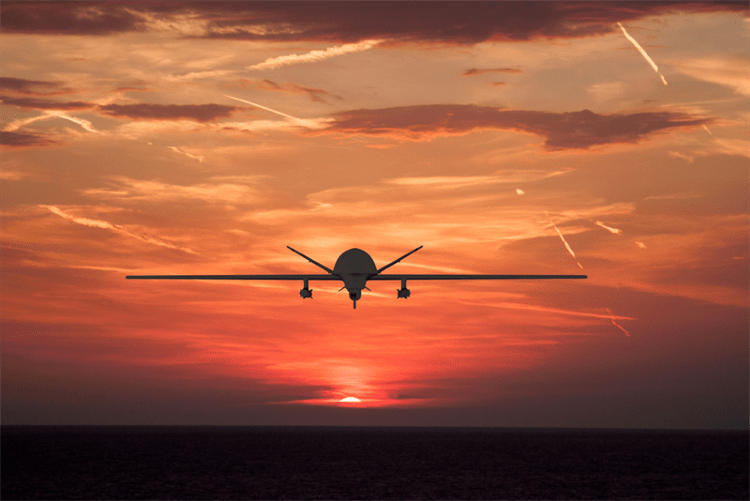Military chiefs and diplomats in some nations have been forcefully opposed to moves to ban autonomous weapons systems recently. While the autonomous defense could make soldiers safer, strong opposition remains for AI-driven systems.

Image Credit: sommthink/Shutterstock.com
New British Army Procurement
Military leaders already possess automatic strike capabilities with weapons that can identify their own targets within a certain area after being launched. AI is being introduced to increase the area over which weapons can make autonomous decisions, and enable weapons to be “intelligent” for a longer period of time.
But as AI technologies are so rapidly progressing, military applications for them are also rapidly increasing and becoming more complex. Military bosses in the UK recently announced a new acquisition process that will see the British Army heavily investing in robotics, AI, and hybrid-power technology from 2021.
The Role of AI in the Military
The use of autonomous defense systems has been argued to reduce the need for putting human soldiers in the way of danger, and to improve the efficiency of military operations.
At UN meetings to discuss the role of AI in the military, the vast majority of participating states have expressed a strong desire to either totally ban or at least strictly regulate the development and deployment of autonomous weapons. This position has the support of UN Secretary General, António Guterres, who has called autonomous weapons “morally repugnant.”
Over 1,000 high-profile experts in artificial intelligence recently signed an open letter to world leaders calling for a ban on autonomous weapons. The signatories warned of the potential for a military artificial intelligence arms race, which would drain resources away from people at a time when the global economy is under threat.
Rapid advancement of military AI – as we saw with military hardware like rockets during the space race – could have serious unintended consequences for the rest of the world. The risks of uncontrolled weapons systems are enough for signatories of the open letter to support a total ban on AI weapons development.
Signatories included Apple co-founder Steve Wozniak, Google DeepMind chief executive Demis Hassabis, professor Stephen Hawking, Elon Musk, and over 1,000 AI and robotics researchers.
Using Autonomous Weapons
Human rights NGO PAX (Netherlands) has published a summary of the problems with autonomous weapons, written by military technology researchers Merel Ekelhof and Miriam Struyk.
Chief among these is that autonomous weapons are largely considered to be unethical.
Autonomous weapons also lower the threshold of going to war. If this entails less risk to soldiers’ lives, politicians will be freer to start wars and engage in military actions. This is because the public is more removed from the acts of war, making democratic control more difficult.
The mechanical manner of artificial intelligence makes it impossible to apply the rule of distinction, a key feature of international law around warfare. Artificial intelligence is unable to distinguish between combatants and civilians reliably, so indiscriminate killings are likely.
Another international law of warfare that cannot be applied by machine thinking is the rule of proportionality. Autonomous weapons systems are unable to weigh military gain against human suffering in war situations due to the complexity and nuance of such decisions.
Chain of responsibility also becomes complicated when militaries use autonomous weapons systems. Lethal force could happen in an accountability vacuum in which no person can be held to account for violations of international law.
This document further argues that autonomous weapons cannot be developed or deployed in a way that allows for real democratic oversight or meaningful accountability. The public and even oversight bodies in governments and militaries may be unable to raise ethical and moral concerns.
Finally, autonomous weapons systems – unlike nuclear weapons and satellite-based weapons systems – are relatively cheap and easy to copy. Developing this technology carries the risk of wide proliferation among states and non-state actors such as terrorists and organized criminals.
Continue reading: Unmanned Aerial Vehicles in the Australian Defense Industry.
References and Further Reading
Judson, J. (2021) UK’s future force to lean heavily into robotics, AI and hybrid power. DefenseNews. Available at: https://www.defensenews.com/digital-show-dailies/dsei/2021/09/16/uks-future-force-to-lean-heavily-into-robotics-ai-and-hybrid-power/
Ekelhof, M. and M. Struyk (2014). Deadly Decisions: 8 objections to killer robots. PAX. [online] Available at: https://paxvoorvrede.nl/media/download/deadlydecisionsweb.pdf
Gayle, D. (2019). UK, US and Russia among those opposing killer robot ban. Guardian. [online] Available at: https://www.theguardian.com/science/2019/mar/29/uk-us-russia-opposing-killer-robot-ban-un-ai
Gibbs, S. (2015). Musk, Wozniak and Hawking urge ban on warfare AI and autonomous weapons. Guardian. [online] Available at: https://www.theguardian.com/technology/2015/jul/27/musk-wozniak-hawking-ban-ai-autonomous-weapons
Disclaimer: The views expressed here are those of the author expressed in their private capacity and do not necessarily represent the views of AZoM.com Limited T/A AZoNetwork the owner and operator of this website. This disclaimer forms part of the Terms and conditions of use of this website.